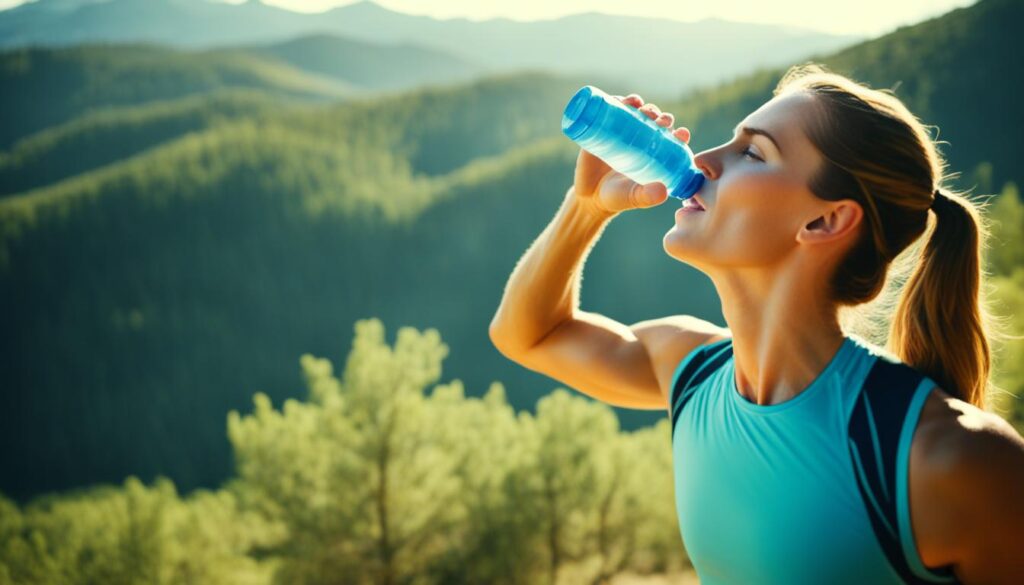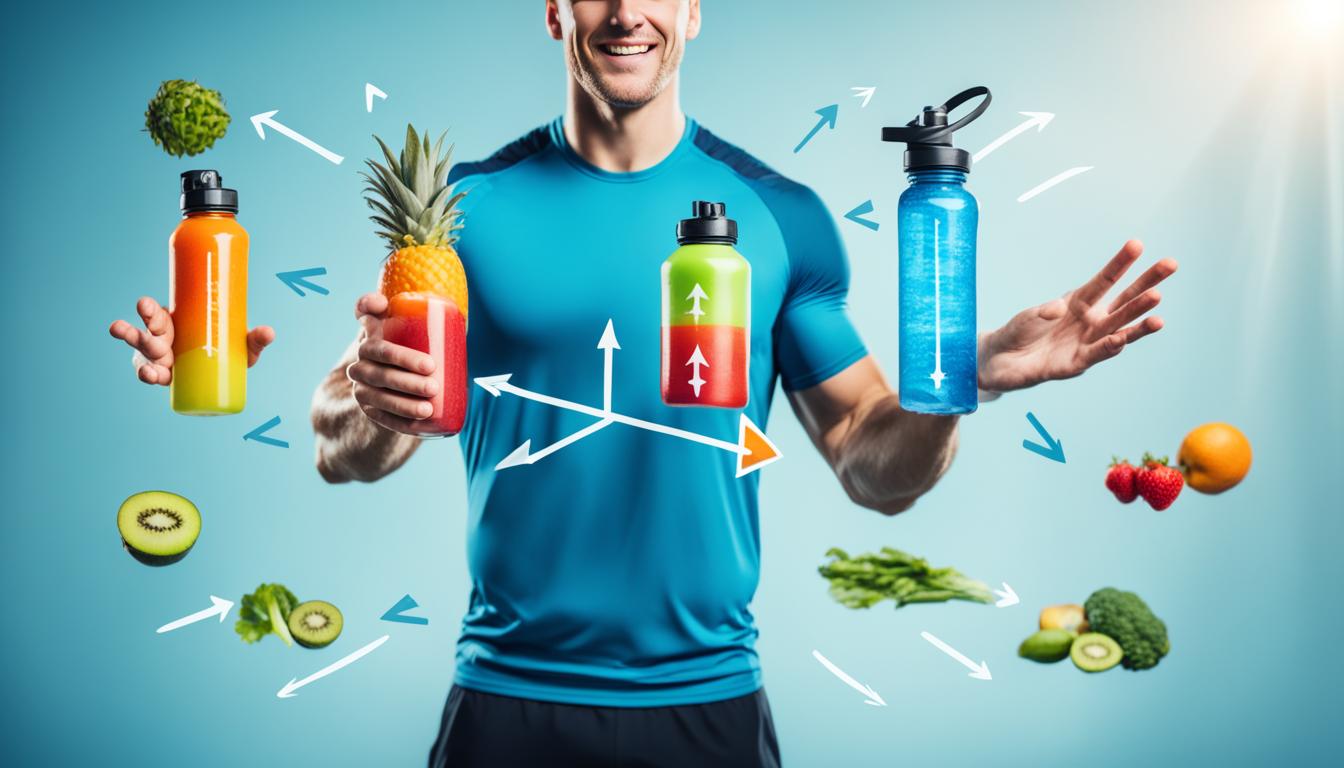The journey to optimal workout performance has made athletes pay attention to every part of their training. But one key part stays just as important: hydration for exercise. Every person who works out or is a professional athlete knows that staying hydrated during workouts is vital. Drinking enough fluids is not just about stopping thirst. It’s key for health and top performance.
Research keeps showing how crucial proper hydration is for athletes wanting to keep their competitive edge and wellbeing. Indeed, a body with enough fluids works like a well-oiled machine. It’s ready to give its best during any physical challenge.
The Importance of Water Intake for Physical Activity
The quest for peak athletic performance involves more than just hard training and discipline. Understanding the importance of water intake for physical activity is also crucial. Athletes need to focus on hydration as much as on workouts, diet, and recovery. Hydration in athletic performance can be the key to setting a record or not, affecting endurance, strength, and energy.

Understanding the Role of Hydration in Athletic Performance
Water is key in sports, supporting many vital functions in an athlete’s body. Drinking water might seem simple, but it replenishes important fluids. These fluids protect joints, help muscles work, and aid in absorbing oxygen. Therefore, hydration in athletic performance is critical for maintaining physical and mental health during hard activities.
How Dehydration Can Impair Athletic Abilities
Not drinking enough water can lead to dehydration, which is a big obstacle to success in sports. This lack of fluids throws off the balance needed for peak performance.
Dehydration and performance
are connected; lower hydration leads to lower performance. Dehydration affects flexibility, speed, endurance, mood, and thinking skills. These skills are necessary for making quick decisions and staying competitive in sports.
| Aspect of Performance | Hydrated State | Dehydrated State |
|---|---|---|
| Muscle Function | Optimal | Compromised |
| Joint Lubrication | Well-maintained | Poor |
| Oxygen Delivery | Efficient | Reduced |
| Concentration | Sharp | Distracted |
| Endurance | Higher | Decreased |
In conclusion, drinking enough water is crucial for any training program. It has many benefits and prevents the negative effects of dehydration. This can halt even the most hardworking athlete’s progress. So, everyone in sports should remember the importance of water intake for physical activity. It’s vital for health and top performance.
Hydration for Exercise: How Much Water Athletes Need

Knowing how dehydration affects performance is key. It can reduce endurance, strength, and attention. This shows how important tips for proper hydration during exercise are. While every athlete is different, basic hydration advice helps a lot.
Athletes lose more water through sweat. They need more than the 91 ounces for women and 125 ounces for men daily. These amounts already include water from foods. Helpful tips for proper hydration during exercise add to this. They make sure athletes drink enough before, during, and after their workouts.
| Hydration Stage | Amount | Timing |
|---|---|---|
| Pre-Exercise | 17-20 ounces | 2-3 hours before exercise |
| Immediate Pre-Exercise | 8 ounces | 20-30 minutes before exercise |
| During Exercise | 4-8 ounces every 15-20 minutes | Throughout activity |
| Post-Exercise | 3 cups per pound lost | After activity completion |
The American Council on Exercise gives these hydration tips. They help avoid problems like muscle cramps or fatigue. By following these steps, athletes keep up their water levels. This is crucial for their best performance and quick recovery.
Practical Hydration Strategies Before Exercise
Finding the best hydration strategies for athletes is essential for top performance and health. A planned approach to drinking fluids can make or break success in sports. Pre-workout hydration techniques are crucial for athletes to be in their best shape.
Pre-Workout Hydration Techniques
Pre-workout hydration is more than drinking water just before exercise. It involves a carefully timed process. This ensures athletes are well-hydrated when they start their workout. They should drink 4 to 6 ounces of water every 15 minutes before exercising. This method prevents too much water intake and keeps hydration levels just right for the activity ahead.
The Role of Electrolytes in Pre-Exercise Hydration
Electrolytes like sodium, potassium, and calcium are crucial for athletes. They help balance fluids, support muscle function, and send nerve signals. For tough or long workouts, replenishing these electrolytes is critical to avoid tiredness and weak muscles.
Choosing the right drinks with these electrolytes can greatly aid in maintaining performance. Here’s a summary of different pre-workout drinks and their benefits:
| Drink Type | Electrolytes Present | Best Used For |
|---|---|---|
| Sports Drinks | Sodium, Potassium, Calcium | Long Duration/High-Intensity Workouts |
| Coconut Water | Potassium, Magnesium, Sodium (lesser extent) | Low-Intensity/Short Workouts |
| Electrolyte Tablets/Mixes | Varied, customizable | Personalized Hydration Plans |
To reach their highest potential, athletes need to follow the best hydration strategies. It’s not only about drinking enough water. The right mix of hydration, electrolytes, and nutrition is what leads them to win.
Best Practices for Staying Hydrated During Workouts
Staying hydrated is key for athletes to do well. It’s not just about drinking water. It’s about drinking it the right way to support the body during tough workouts. Knowing how to stay hydrated can really help both health and performance.
Athletes need to think about how much they sweat, the weather, and how hard their workout is. It’s better to drink small amounts often instead of a lot at once, which can cause problems. Drinking fluids every 15 to 20 minutes can keep you hydrated, especially during long workouts.
- Start drinking water before you exercise to get a good level of hydration.
- Switch between water and sports drinks during long workouts to get back electrolytes.
- Look at your urine’s color to check hydration; light yellow is good, dark means drink more.
The type of drink is just as important as when you drink it. Water is usually enough, but sports drinks are better for endurance athletes or those training in the heat. These drinks have electrolytes and carbs to keep energy up and balance electrolytes.
| Workout Duration | Hydration Strategy | Fluids Recommended |
|---|---|---|
| Less than 1 hour | Water is adequate | Drink 7-10 oz every 20 minutes |
| 1 to 2 hours | Water and electrolyte replacement | Water + Sports drink for electrolytes |
| 2 hours or more | Hydration with electrolytes and carbohydrates | Water + Sports drink with carbs and electrolytes |
Hydration is about smart drinking choices that meet an athlete’s unique needs. Using the best strategies helps athletes stay hydrated effectively and beneficially.
Post-Exercise Hydration Tips for Optimal Recovery
Good hydration after exercise is key for any athlete’s recovery. When you work out, you lose water through sweat. It’s important to drink enough to replace what’s lost and help your body recover. Doing this gets your body back to how it was before exercising and supports future performance. Following expert tips on hydration can ensure athletes recover properly after working out.
Assessing Hydration Needs After Training
To know how much to drink after exercising, use a scale. Weigh yourself before and after your workout. This shows how much fluid you’ve lost. Experts say to drink 20-24 ounces of water for every pound lost. This step is crucial for quick recovery. If you skip it, you might get dehydrated and not reach your fitness goals. By following this rule, athletes make sure they’re getting the hydration they need after a tough workout.
Strategies for Replenishing Fluids and Electrolytes Post-Exercise
It’s also important to replace lost electrolytes after working out. Sports drinks are great because they have key electrolytes like sodium and potassium. Adding foods like watermelon or yogurt to your post-exercise meal helps too. Interestingly, chocolate milk is great for recovery. It has the right mix of carbs and proteins for muscle repair and rehydration. These steps are key for the best hydration after exercising. They help athletes stay at the top of their game.




